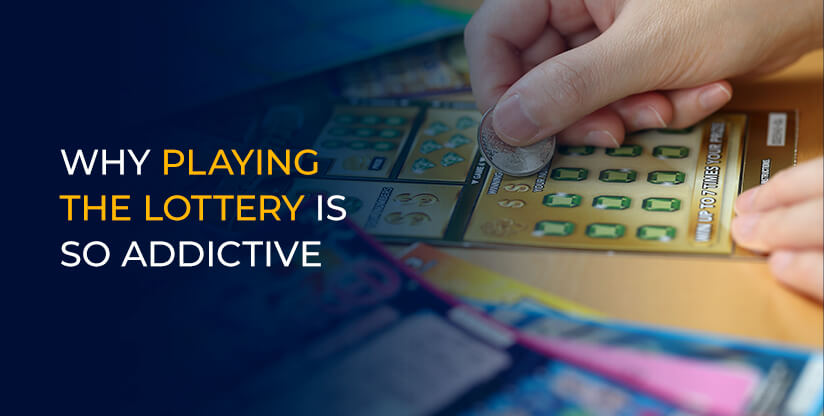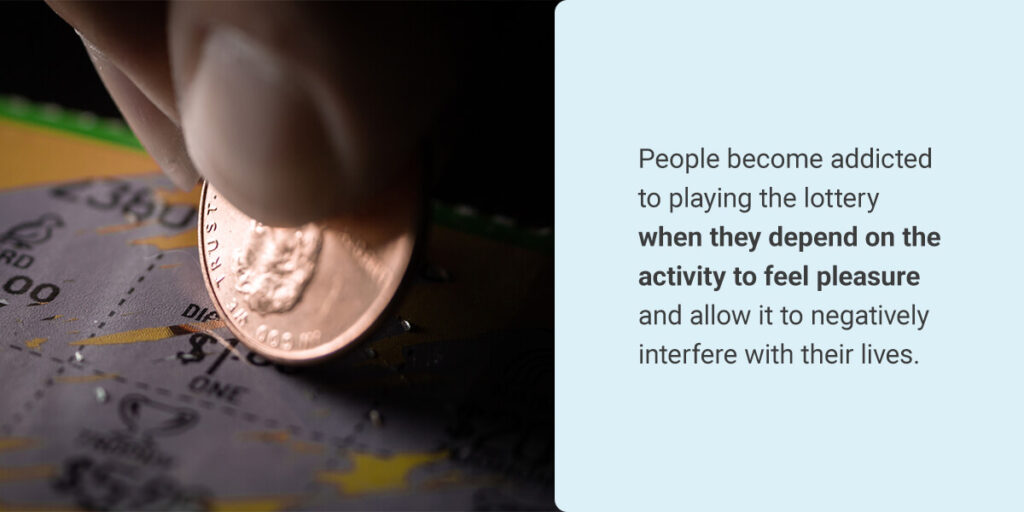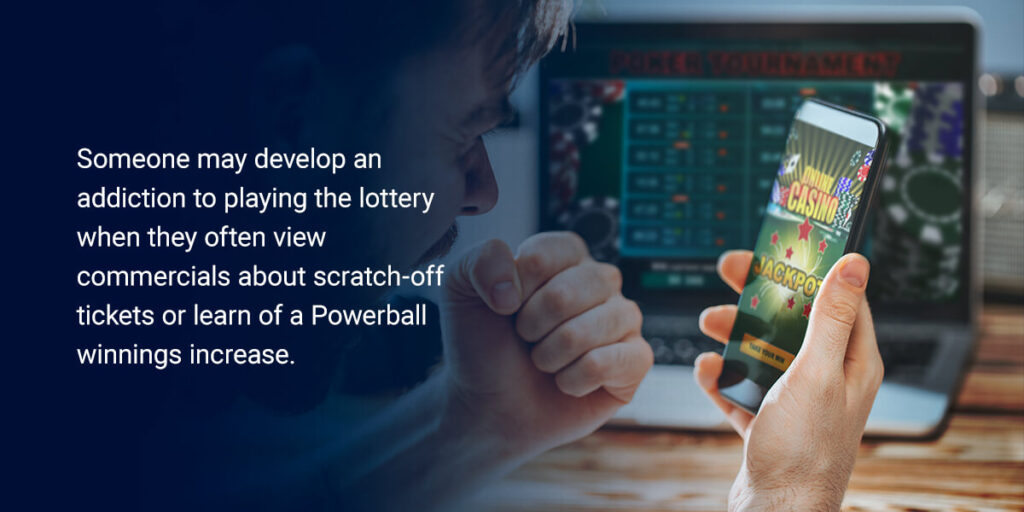- Dec 19
- Addiction

The lottery is a common entertainment source that can quickly become addictive. Playing the lottery can become addictive when an individual develops an unhealthy compulsion to engage in it. While purchasing lottery tickets occasionally does not indicate an addiction, playing the lottery excessively can become an addiction. Playing the lottery activates the same pleasure centers in the brain as substance use disorder and other compulsive behaviors, causing some people to engage in it unhealthily.
Lottery tickets are about as accessible as alcohol or cigarettes due to their presence in most gas stations and grocery stores. Playing the lottery is also commonly reinforced in commercials or on billboards, putting it at the forefront of people’s minds more frequently.
Since people often play the lottery with thrill-seeking intentions and the potential to win money, an addiction to the lottery is a form of gambling addiction. A person with a lottery addiction may neglect responsibilities to play the lottery or go into debt from purchasing tickets regularly.
Lottery addiction is treatable, and it is possible to stop playing the lottery and recover. With helpful treatment methods, you or a loved one can return to positive relationships, work responsibilities, and healthy hobbies. Understanding what causes lottery addiction and how to treat it can help you or a loved one overcome this compulsion.
Are Lottery Tickets Addictive?
If you are wondering if scratch-off gambling is addictive, it’s important to consider the frequency in which a person plays the lottery and how they allow it to drive their behavior. Lottery tickets themselves are not addictive, but the habit of playing the lottery can become addictive.
When a person purchases a lottery ticket, they most likely have some hope they might win some money. However, this hope can intensify when someone develops an addiction to playing the lottery. Lottery games may not have the same high stakes as casino games or race track bets, but they can provide the same temporary satisfaction that many compulsive behaviors provide.
A scratch-off addiction can be categorized as a type of gambling addiction, and approximately 5 million American adults experience gambling compulsion. State governments offer lotteries to increase revenue and fund projects such as senior services, environmental protection, and education, but lotteries can become harmful when people develop an addiction to them.

How People Become Addicted to Playing the Lottery
The idea of winning the lottery is probably appealing to anyone, and many people most likely have an idea of what they would do if they won some extra cash. However, lottery addiction can occur when someone becomes obsessed with the idea of winning the lottery. A person may place their hopes, dreams, and goals on lottery tickets, fantasizing about their potential winnings often. Lottery addiction can also occur when a person becomes addicted to the thrill of playing lotteries.
Purchasing a lottery ticket now and then doesn’t guarantee a person will become addicted to the behavior. However, purchasing tickets routinely can lead to addiction. Forming a habit and using lottery tickets to cope with uncomfortable feelings can take lottery games from an occasional activity to a harmful addiction. While many people view the lottery as a socially acceptable type of gambling because it’s inexpensive, it can still become an unhealthy habit.
People become addicted to playing the lottery when they depend on the activity to feel pleasure and allow it to negatively interfere with their lives. Addiction may develop when a person consistently purchases lottery tickets or continuously increases the number of tickets they purchase.
Factors That Can Increase Lottery Addiction
Some factors can increase a person’s likelihood of developing a lottery addiction. You or a loved one may be more vulnerable to a lottery addiction due to the following factors:
Genetics
Genetics can predispose individuals to experience addiction and engage in compulsive behaviors. Allele variants are specific gene forms that communicate with chemical messengers in the brain directly related to compulsive gambling. When people have allele variants related to compulsive gambling, they can pass them down to their children and future family generations. If a person has a parent, grandparent, aunt, or uncle with a gambling addiction, they are more vulnerable to developing it as well.

Environment
Environmental factors can also increase a person’s likelihood of developing an addiction to the lottery. If a person frequently visits convenience stores or other establishments that sell lottery tickets, the opportunity to purchase tickets may become increasingly appealing to them, leading to compulsive behavior. Additionally, advertisements can feed a person’s compulsion to purchase tickets. Someone may develop an addiction to playing the lottery when they often view commercials about scratch-off tickets or learn of a Powerball winnings increase.
Peer pressure can influence an addiction to play the lottery. If friends or family frequently play the lottery, an individual may play it increasingly often because it’s a shared activity or because it seems appealing. People can also become more vulnerable to addiction when they experience stress. Financial instability or unemployment can cause emotional stress, leading a person to use gambling as a coping mechanism.
Brain Chemistry
If your brain has increased levels of the stress hormone, norepinephrine, you may indulge in pleasure-seeking behaviors to counteract the stress. Additionally, increased dopamine levels and abnormal serotonin levels can increase the likelihood of developing a lottery addiction.
Serotonin is a neurotransmitter that plays a part in regulating mood and behavior, and it causes euphoric and pleasurable feelings. Low serotonin levels can cause individuals to engage in behaviors that increase serotonin levels.
Mental Health
Addiction and addictive behaviors, such as playing the lottery, may coincide with other mental health conditions. A person experiencing lottery addiction may also have co-occurring disorders like depression, borderline personality disorder (BPD), attention-deficit/hyperactivity disorder (ADHD), or bipolar disorder.
Age and Gender
Anyone can become addicted to the lottery, but most people who experience a gambling addiction are young adults or middle-aged individuals. If a person is exposed to gambling habits during childhood, they are more likely to develop a gambling addiction as an adult. Older adults can also develop a gambling addiction during their later years or retirement.
Gender can also affect a person’s predisposition to developing an addiction. It’s more common for men to experience gambling addiction than it is for women, but male and female gambling addiction trends are becoming more similar.
Signs of Lottery Addiction
Buying a lottery or scratch-off ticket occasionally does not indicate a person has a lottery addiction. However, you or a loved one may be experiencing a lottery addiction if you notice any of the following signs:
- A need to increase gambling amounts or frequency
- Preoccupation or obsession with purchasing scratch-off tickets or checking lottery numbers
- Playing the lottery to cope with emotions such as depression, anxiety, or stress
- Lying to hide lottery tickets or the amount of money spent on tickets
- Unsuccessful attempts to stop or reduce lottery ticket purchasing
- Immediately reinvest any winnings on more lottery tickets
- Asking for money from others to buy lottery tickets and scratch-offs
- Routinely coping with losses by playing the lottery the following day
- Jeopardizing relationships to spend money on the lottery
- Neglecting bills and other monetary responsibilities to play the lottery
- Arranging your schedule to play the lottery every day
- Feeling guilty or shameful after playing the lottery but continuing to play it
While many people purchase lottery tickets when they put gas in their car, purchase food, or run an errand, someone with a gambling addiction may feel the compulsion to purchase a lottery ticket every day and neglect important tasks to prioritize playing the lottery. They may arrange their schedule to purchase lottery tickets frequently and plan for lottery winnings with the expectation that they will win. If a person’s addiction to playing the lottery interferes with their bills and close relationships, they often hide their behaviors by throwing tickets away before others see them.
Borrowing or stealing money is also a sign of gambling addiction. If you spend more money than you can afford on lottery tickets and continue to seek money to purchase more tickets, you may have a gambling addiction. When someone has an addiction, they will often jeopardize relationships and neglect responsibilities to indulge in unhealthy behaviors that feed their addiction. They may take money out of their savings to purchase lottery tickets or find themselves in debt due to their ticket purchasing.
A person is addicted to playing the lottery when they continue to play despite negative consequences. People who do not experience gambling addiction usually stop gambling when they reach a personal maximum loss or experience a negative consequence.
Why Playing the Lottery Is So Addictive
Playing the lottery can become addictive because of how it affects our brains. When people become addicted to drugs or alcohol, it is because the substances release high levels of dopamine in the brain. Dopamine is a neurotransmitter that creates a sense of pleasure. It’s known as a feel-good hormone and is a part of the brain’s reward system.
The brain releases dopamine when we do things necessary for survival such as drinking water, eating food, and reproducing. However, unhealthy behaviors can also release large amounts of dopamine, which can cause people to seek the same feeling by repeating the behaviors. Gambling can release dopamine in the brain for two reasons. One reason is the potential for monetary gain, and the other reason is the thrill of risk-taking.
When a person engages in financial risk-taking behaviors such as purchasing lottery tickets, their brain may release elevated dopamine levels and stimulate the brain’s pleasure centers. The thrill of unpredictable wins and losses becomes a reward for taking a risk, creating euphoric experiences that people chase when they become addicted.

How Can I Stop My Addiction to Scratch-Off Lottery Tickets?
Seeking treatment for gambling addiction is important, especially when the addiction interferes with your relationships, job, and other responsibilities. If you are wondering how to stop scratch-off addiction or find freedom from a gambling compulsion, there are ways to get your life back on track. You or a loved one can address addiction to the lottery with the following tips:
Join a Support Group
Seeking support is important if you or a loved one is experiencing an addiction to the lottery. Compulsive gambling support groups are excellent self-help opportunities. Joining a 12-step program or participating in group therapy is a great way to engage in fellowship with peers experiencing similar challenges as you and receive encouragement as you abstain from playing the lottery.
Try Cognitive Behavioral Therapy
Cognitive behavioral therapy (CBT) is a form of talk therapy you can complete with a therapist. During CBT, you talk about any negative beliefs you have, and a therapist challenges these beliefs to replace them with more accurate ones.
Ask Your Doctor About Medications
Since co-occurring conditions can contribute to lottery addiction, medications to treat any co-occurring conditions can support your recovery process. Talk to your doctor about medications that can help you manage co-occurring disorders such as anxiety and depression. This can help reduce your urge to purchase lottery tickets.
Adopt Healthy Habits
You or a loved one may have certain emotions, moods, or boredom that increase the compulsion to play the lottery. You can help manage your compulsion by distracting yourself with healthy habits. Try new hobbies that interest you, such as painting, kayaking, hiking, pottery, cooking, reading, writing, or sports.
Spend time with friends and family who also abstain from lottery games and support your recovery. You can also engage in physical activity such as yoga, running, or exercise routines. Adopting healthy habits is an excellent way to replace compulsive behavior with beneficial activities.
Contact Gateway Foundation for Help With Lottery Addiction
Playing the lottery can quickly become addictive when it becomes a compulsive behavior. Purchasing lottery tickets for entertainment purposes occasionally doesn’t necessarily indicate a person has an addiction. However, a person can develop an addiction to playing the lottery when they play regularly and allow it to interfere with their daily life.
Playing the lottery offers unpredictability and a small potential for monetary gain, which activates the brain’s pleasure centers. If a person depends on lottery tickets for this pleasure release or uses lottery games to cope with uncomfortable emotions, they may begin to engage in unhealthy behavior. They may go into debt purchasing excessive amounts of lottery tickets, neglect their work responsibilities, or jeopardize relationships with the people they love.
An addiction to playing the lottery is treatable, and people can find freedom from this compulsive behavior. Treatment methods such as group therapy, medication, cognitive behavioral therapy, and adopting healthy habits can support you or a loved one in breaking a lottery addiction.
If you or a loved one is looking for lottery addiction help, Gateway Foundation can offer support. Gateway Foundation offers effective gambling addiction treatment to help individuals stop gambling and get their lives back on track. With effective treatment, you can recover from lottery addiction and get back to your family, job, and hobbies you enjoy. At Gateway Foundation, we are with you for life.
Contact Gateway Foundation to learn more and find relief from lottery addiction.



